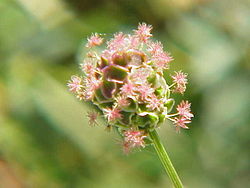Sanguisorba
| Lifespan: | ⌛ | perennial |
|---|
|
Rosaceae > |
L. > |
If this plant info box on watering; zones; height; etc. is mostly empty you can click on the edit tab and fill in the blanks!
Sanguisorba is a genus of perennial herbs or small shrubs in the family Rosaceae, native to the temperate regions of the Northern Hemisphere. The common name is Burnet. The stems grow to 50-200 cm tall, with a cluster of basal leaves, and further leaves arranged alternately up the stem. The leaves are pinnate, 5-30 cm long, with 7-25 leaflets, the leaflets with a serrated margin. Young leaves grow from the crown in the center of the plant. The flowers are small, produced in dense clusters 5-20 mm long; each flower has four very small petals, white to red in colour.
Read about Sanguisorba in the Standard Cyclopedia of Horticulture
|
|---|
|
Burnet (Potbrium Sanguisorba, Linn.). A hardy rosaceous perennial, the piquant Lvs. of which are sometimes used in flavoring soups and salads. The dried roots are occasionally used as a family remedy. Burnet is little known in this country as a condimental herb. It is worthy a place in the hardy border for the ornamental character of its odd-pinnate Lvs. and its little heads of fls. with drooping stamens. The Lfts. are very dark green, ovate and notched: sts. 1-2 ft. high, bearing oblong or globular monoecious heads. Of easiest cult., either from seeds or by division of the clumps. Native of Eu.
|
Read about Sanguisorba in the Standard Cyclopedia of Horticulture
|
|---|
|
Sanguisorba (Latin, blood and drink up, from reputed styptic properties in folk-medicine). Rosaceae. Chiefly perennial herbs, grown as salad plants and also sometimes used in the hardy border. Leaves unequally pinnate; stipules adherent to the petiole: fls. small, often polygamous or dioecious, crowded in a dense head or spike at the summit of a long, naked peduncle; calyx-tube persistent, with 4 broad petal-like spreading deciduous lobes; petals none; stamens 4-12: achene (commonly solitary) inclosed in the 4-angled dry and thickish calyx-tube.—About 35 species, natives of the North Temperate Zone. See Poterium. S. atrosanguinea, Hort., is a form listed in the trade as having wiry sts. 3 ft. high bearing heads of rich crimson fls. Possibly the European S. officinalis, Linn. CH
|
Cultivation
Burnet tolerates drought, heat and cold well. The leaves contain Vitamin C; those of S. minor have a mild, cucumber-like taste, and are sometimes used in salads
Propagation
Pests and diseases
Species
- Sanguisorba albanica
- Sanguisorba alpina
- Sanguisorba ancistroides
- Sanguisorba annua
- Sanguisorba applanata
- Sanguisorba armena
- Sanguisorba canadensis - Canadian Burnet
- Sanguisorba caucasica
- Sanguisorba cretica
- Sanguisorba diandra
- Sanguisorba dodecandra - Italian Burnet
- Sanguisorba filiformis
- Sanguisorba hakusanensis - Hakusan Burnet
- Sanguisorba hybrida
- Sanguisorba magnifica
- Sanguisorba menendezii - Canary Islands Burnet
- Sanguisorba menziesii
- Sanguisorba minor - Salad Burnet
- Sanguisorba obtusa - Japanese Burnet
- Sanguisorba officinalis - Great Burnet
- Sanguisorba stipulata
- Sanguisorba tenuifolia - Asian Burnet
Gallery
References
- Standard Cyclopedia of Horticulture, by L. H. Bailey, MacMillan Co., 1963
External links
- w:Sanguisorba. Some of the material on this page may be from Wikipedia, under the Creative Commons license.
- Sanguisorba QR Code (Size 50, 100, 200, 500)
